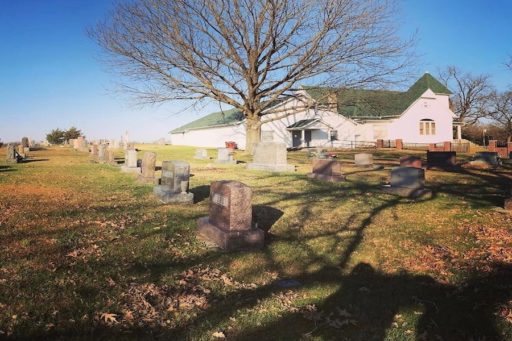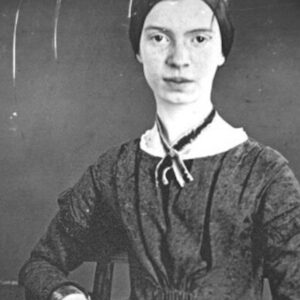The gravedigger catches my eyes: his grizzled stubble and worn cap, the curly hank of yellow-gray hair riding his neck. Even in his mechanic’s fatigues, he looks like a monk I know with the same hair and glasses, the same lean jaw. “I went from sex, drugs, and rock ‘n roll to chastity, poverty, and obedience,” the monk likes to quip. He is a gravedigger too, when needed by his brothers and sisters. I remember the monk as I watch his doppelganger and a boyish assistant perform their tasks: trussing the winches, pulleys, and straps of the collapsible metal frame that holds the heavy casket above a concrete vault we can barely see.
We watch in silence, as if their work is some kind of passion play. I try to mark the passes: something cinched, something threaded, something braced, unbolted, flipped, bolted again, with a little wobble at the casket that reminds us it holds a body, human and delicate. I think of the summer I worked in Cyprus, when the old stitches of an old miscarriage burst and I ended up in a hospital attended by Sri Lankan nurses who listened to me when I cried for grief and changed my bedclothes gently. They were young, invisible in that city; they showed me pictures of their mothers on their phones, and there was a similar, inscrutable logic in their swaddling and kind shifting of a heavy, unknown body in a bed.
Behind us, just beyond a gesturing tree is the grave where my husband’s first wife is buried. It is a place I have visited with him before, and a place he and his children—our children?—visit on their mother’s birthday, feast day, wedding day. She is there; I accept it. Still I am surprised by the manicured, indexed lawns of modern city cemeteries, inserted among freeways and strip malls. Is this the way to wait for resurrection—wouldn’t it be noisy? And there is something in the space akin to the flowers on the funeral wreaths: beautiful flowers, well groomed, but grown to an appointed size and shape and stained an appointed color. Roses like plastic bulbs, lilies like pallid fists that crack / open and the wands / of the lilies / quicken, they rise / like pale poles / with their wrapped beaks of lace; / one day they tear the surface.
Now the rickety whine and whir of the casket descending in its sling, crank by crank, so expedient as to be lonely and strange and almost comical, except when I look at the gravedigger and think of my monk friend. Who is this woman going down into the ground? I met her only once: at my wedding, almost a year ago to the day, the wife of a man my husband worked with for many years. She was sick with cancer but she must have looked well that day—like herself, the strong and lovely middle-aged woman in the photographs at the funeral Mass—because I don’t remember her in our receiving line. She was loved to the end and now I am among the mourners standing in the sun beside her graveside tent, giving the covered chairs to her husband and children, the elderly, and young mothers, wondering that she and I—strangers—may share the same ground, may wake and fly together on the last day.
And there you are / on the shore, / fitful and thoughtful, trying / to attach them to an idea—some news of your own life.The poet is speaking of the lilies, but I am speaking of everything: the lawn, the grass, the gesturing tree; the gray headstone that, at the children’s insistence, already bears the names of both my husband and their mother. The graves are two-deep; there is room for four bodies in the marriage plot. My husband told me this just after our engagement, a gesture to a gift that might have disturbed another bride but brightly consoled old worries and griefs: not only care for the child who, in dying in my body, will take my grave as well, but the loss of the burial plot of my childhood—the white Baptist church, the tall, steady trees, the beloved names arrayed and abreast on the hill above a gravel road.
The body is gone in the vault. The gravedigger and his assistant break down and tote away the metal frame, the bolts, the straps, the bag of tools. They depart without a word and we sing; the priest blesses us. The mourners leave in the sun and my husband takes my hand and walks back up past the tree to stand before the grave where his children’s mother lies. There are tears in his eyes; I put my arms around him. He tries to apologize and I kiss his cheek.
When the dead rise, they will neither marry nor be given in marriage; they will be like the angels in heaven: Jesus says this to the Sadducees almost by accident, to thwart a riddle and an insult. I remember these words and wonder over the soul and the body, the sacramental mark and the earthly bond, one eternal and one forgettable while yet the lilies / are slippery and wild—… / they are simply doing, / from the deepest / spurs of their being, / what they are impelled to do / every summer. / And so, dear sorrow, are you.
Laura Bramon Hassan is a writer and international development practitioner based in Washington, DC. Her writing has appeared in The Best Creative Non-Fiction, Vol. 3 (W.W. Norton), Image, University of Notre Dame’s Church Life Journal, First Things online, Humanum Review, and other outlets.





